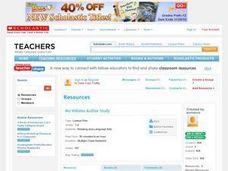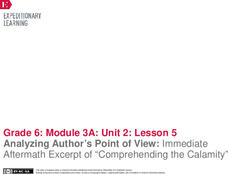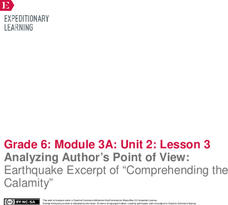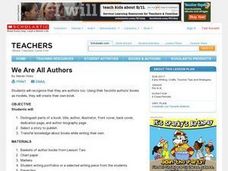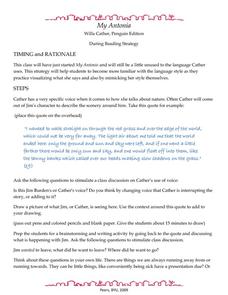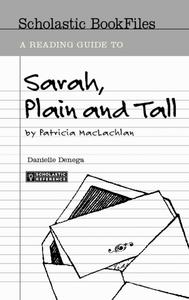Curated OER
Hermeneutics: Teaching Students Author's Purpose
Your developing literary critics discuss 'perspective' and discuss how the same occurence can be interpreted by two different people in two different ways. They read Ryszard Kapuscinski's untitled poem, infer meaning of the poem, and...
Curated OER
Determining Author's Point of View: The Sneeches
Determine the author's point of view in a text. Young readers read Dr. Seuss' The Sneeches and identify the author's purpose in the story. They identify persuasive techniques in writing, asking and answering questions to better...
Curated OER
Our Computers, Ourselves: Imagining the Digital Lives of Authors and Characters
The guiding question for this instructional activity is "Do computers and their contents shape who we are?" Open with a selection of Apple's commercials to introduce stereotypes and people's relationships with their computers. Then, read...
Weebly
Author Study: Eric Carle
Dive into an author study of one of the most beloved children’s book authors, Eric Carle. After reading some of his stories, including Papa Get me the Moon, A House for Hermit Crab, The Grouchy Ladybug, and The Very Busy...
Curated OER
Mo Willems Author Study
Who is Mo Willems? Explore the author with your class. Learners read books written by Willems, compare and contrast the characters therein, and make predictions about what will happen. Finish off this author study by having small groups...
United K12
Jan Brett Author Study
Expose young children to the wonderful works of author and illustrator Jan Brett using a few of her stories such as Armadillo Rodeo, The Mitten, or Daisy Comes Home through a unit study.
EngageNY
Analyzing Author’s Point of View: Immediate Aftermath Excerpt of “Comprehending the Calamity"
Analyze that! Scholars continue reading and analyzing a primary source about the immediate aftermath of the 1906 San Francisco fire and earthquake. Then, individuals use graphic organizers to identify the author's point of view.
EngageNY
Analyzing Author’s Point of View: Earthquake Excerpt of “Comprehending the Calamity”
How do authors convey their points of view? Using the resource, scholars read an excerpt from a primary source document about the 1906 San Francisco earthquake. Then, they complete graphic organizers to analyze the author's point of view.
Curated OER
Author Study: Cynthia Rylant
Explore the life's work of one of the great children's authors using this ten-lesson author study unit. After first performing some whole-group research into the life of Cynthia Rylant, the class goes on to read six different...
Curated OER
We Are All Authors
Students analyze the components of a book to use it as a model for the creation of their own book. The title, author, illustrator, front cover, back cover, dedication page, and author are examined in this lesson.
Curated OER
Author's Purpose
Sixth graders brainstorm the reasons authors write, and they list their responses on the board. Students discuss each purpose they have listed.Students work independently to read the selection "Tarantulas and Typhoid" by...
Curated OER
Author's Purpose
How do you determine an author’s purpose? You ask the author, of course. Invite a local journalist into the class to respond to scripted student questions about his/her writing process. A review of basic classroom etiquette is also...
Curated OER
My Antonia: During Reading Strategy
Home in on the quote on this page to explore setting, the author's and character's voices, and plot in Willa Cather's My Antonia. Pupils draw a picture of what is described in the quote, discuss the content, and make connections to their...
EngageNY
Analyzing the Author’s Perspective: “The Shakespeare Shakedown”
Simon Schama's article "The Shakespeare Shakedown" allows young writers to see how authors respond to conflicting viewpoints. Class members participate in discussion appointments with five peers to explore the author's point of view.
EngageNY
Mid-Unit Assessment: Analyzing an Author’s Argument and Text Structure
William Shakespeare: a writer, a poet, a fake? For their mid-unit assessments, scholars read an excerpt from the article "The Top Ten Reasons Shakespeare Did Not Write Shakespeare" by Keir Cutler. Next, they analyze the author's argument...
EngageNY
Studying Author’s Craft: Carlotta’s Journey
The longest journey begins with a single step. Scholars analyze the details of Carlotta Walls LaNier's journey through the desegregation of schools in the United States. They continue reading the author's memoir, A Mighty Long Way and...
EngageNY
Identifying Author’s Opinion and Evidence: The Value of Sports in People’s Lives, Part II
Context matters! Using the intuitive resource, pupils decipher context clues to determine the meaning of unknown words from an informational text. Also, in small groups, they practice identifying the author's opinion and supporting...
Curated OER
Reading-Author's Purpose
Students review what author's purpose is by understanding that authors either persuade, inform, describe, or entertain with their story. For this language arts lesson, students bring in junk mail and in small groups discuss what the each...
Curated OER
Lesson 1: Author's Voice in a Poem
Second graders use the title and text clues from a poem to determine what the author's voice is. In this author's voice lesson, 2nd graders participate in a directed lesson using the poem "Amazing Bats." They discuss their feelings with...
Scholastic
A Reading Guide to Sarah, Plain and Tall
Eliminate the hard work of creating an entire literature unit with this reading guide for the novel Sarah, Plain and Tall. From background information about the author and her motivation for writing the story to...
EngageNY
Reading about the Author’s Perspective: Why Do Authors Write about Natural Disasters?
It's all about perspective. Scholars view a note from the author in Eight Days. They determine the gist and discuss what they can learn about the author's background based on the note. They then complete a fishbowl activity in...
Curated OER
Create a Book with Student Treasures
You can't publish a story until after it has been revised and edited! Budding authors investigate the writing process while drafting an original story. They select a topic, complete a rough draft, edit it, revise it, and finally publish...
Alabama Department of Archives and History
A College Student's Perspective on WWI
Some things remain the same, such as the world being on the brink of war, or college attendees writing home requesting money. As part of their research into events that led up to President Wilson's declaration of war on...
Maine Content Literacy Project
Introduction to Short Story Writers Say
There are so many authors of short stories, and your class can have the chance to study quite a few. This seventh lesson in a series of fourteen continues the decision-making process for the final assessment: a short story author study....




